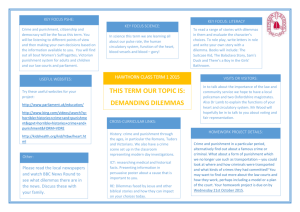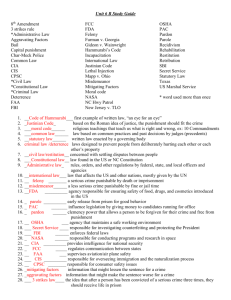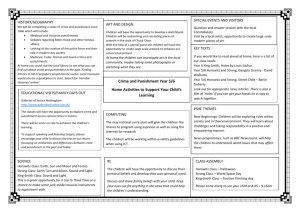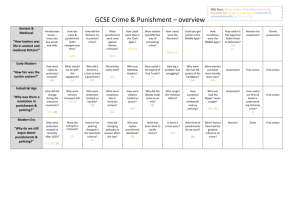Assignment Schedule – Sociology 494
advertisement
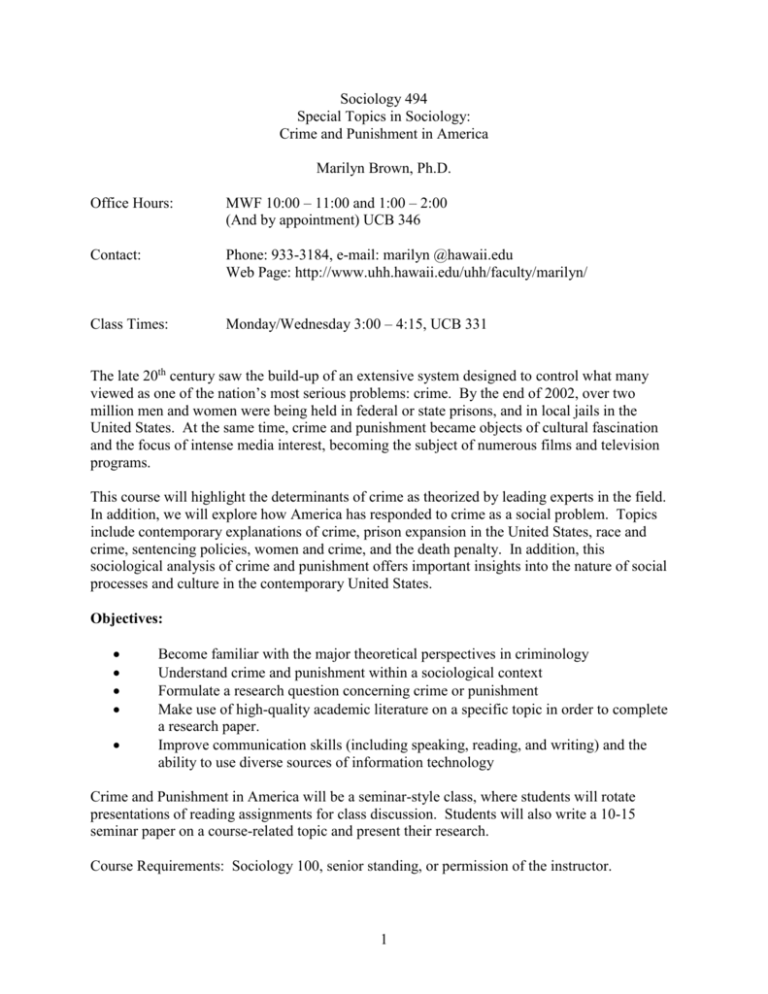
Sociology 494 Special Topics in Sociology: Crime and Punishment in America Marilyn Brown, Ph.D. Office Hours: MWF 10:00 – 11:00 and 1:00 – 2:00 (And by appointment) UCB 346 Contact: Phone: 933-3184, e-mail: marilyn @hawaii.edu Web Page: http://www.uhh.hawaii.edu/uhh/faculty/marilyn/ Class Times: Monday/Wednesday 3:00 – 4:15, UCB 331 The late 20th century saw the build-up of an extensive system designed to control what many viewed as one of the nation’s most serious problems: crime. By the end of 2002, over two million men and women were being held in federal or state prisons, and in local jails in the United States. At the same time, crime and punishment became objects of cultural fascination and the focus of intense media interest, becoming the subject of numerous films and television programs. This course will highlight the determinants of crime as theorized by leading experts in the field. In addition, we will explore how America has responded to crime as a social problem. Topics include contemporary explanations of crime, prison expansion in the United States, race and crime, sentencing policies, women and crime, and the death penalty. In addition, this sociological analysis of crime and punishment offers important insights into the nature of social processes and culture in the contemporary United States. Objectives: Become familiar with the major theoretical perspectives in criminology Understand crime and punishment within a sociological context Formulate a research question concerning crime or punishment Make use of high-quality academic literature on a specific topic in order to complete a research paper. Improve communication skills (including speaking, reading, and writing) and the ability to use diverse sources of information technology Crime and Punishment in America will be a seminar-style class, where students will rotate presentations of reading assignments for class discussion. Students will also write a 10-15 seminar paper on a course-related topic and present their research. Course Requirements: Sociology 100, senior standing, or permission of the instructor. 1 Required Texts: Bedau, Hugo Adam, ed. 1997. The Death Penalty in America: Current Controversies. New York: Oxford University Press. (ISBN: 0-19-512286-0 Pbk) Mauer, Marc and Meda Chesney-Lind. 2002. Invisible Punishment: The Collateral Consequences of Mass Imprisonment. New York: New Press. (W.W. Norton & Co.) (ISBN: 156584-848-9 Pbk) Paternoster, Raymond and Ronet Bachman. 2001. Explaining Criminals and Crime. Los Angeles: Roxbury Publishing Company. (ISBN: 1-891487-32-9 Pbk) Additional readings as assigned. Attendance Policy & Special Needs Regular attendance is essential. If you should miss a class be sure and get the notes from a classmate. You are responsible for taking exams and doing your presentation on the day specified. If you miss an exam or presentation because of illness, I will require a doctor’s note. If any student with a documented disability would like to request accommodation, they should contact the University Disability Services Office at 933-0816 (V), 933-3334 (TTY), shirachi@hawaii.edu, or visit Campus Center Room 311 as early in the semester as possible. Academic Ethics Academic dishonesty hurts all of us by undermining the values of the UH community and, ultimately, the value of your education. Cheating and plagiarism affect overall student grades and, therefore, will not be tolerated in this classroom. Become familiar with the section on academic dishonesty in the Student Conduct Code because you will be held to its rules in this class. Academic dishonesty includes presenting others’ ideas as your own, cheating on exams, falsifying data, or failing to properly cite others’ work. I will not hesitate to give students who are caught deliberately engaging in these behaviors a failing grade for the course. Nor will I hesitate to use any other recourse noted in the Student Conduct Code as a sanction. Bottom line: It’s soo not worth it! Course Requirements and Grading There will be one exam, three group presentations, a bibliography, and a research paper of 10-15 pages. Annotated Bibliography Exam Presentations (3) Individual research presentation 10% 20% 15% 15% 2 Final Paper 40% Exam: This will be an in-class exam on the material in the Paternoster/Bachman text. Group Presentation: Each student will participate as a member of one of six groups that will be responsible for presenting the scheduled reading to the class. I encourage students to be as creative as possible in explaining the material. Skits, role-playing, video segments, songs, or other forms of expression are all permitted! The main thing is to work collectively to understand and present the material to the class. Remember that the class will depend on you to explain the important concepts to them in a clear, enjoyable way. Each student will receive an evaluation from the members of the group which will be factored into their group presentation grade. Annotated Bibliography: The bibliography will be composed of lists of sources from peerreviewed sociology/criminology journals. Each student bibliography will include five such articles as a minimum. Provide a list of ten sources (including the five journal articles) with notes about the material. Two copies will be due on February 25th. I expect to see these sources cited in the final paper. Suggestions: Find literature reviews on your subject as soon as possible in the term. Add sources later as necessary, but be sure to decide on the major sources early on in the semester. Research Paper: Begin by selecting your topic at the beginning of the semester. Submit the topic along with a paragraph about the research question by the end of January (January 28th). Be as specific as possible. For example, rather than writing about “serial killers,” write a paper addressing the question of why most serial killers have been white males (and why this might be changing!). Instead of writing a paper on crystal methamphetamine, write the paper about the merits of using a public health rather than a criminalization approach to the problem “ice” in Hawai‛i. I will expect to see reference to theoretical perspectives cited in your work. 3 Assignment Schedule – Sociology 494 1 Mo. Day Class Tasks Reading Assignment January 12 Introduction Handout: Criminology: Explaining Crime and Its Context, Chapters 3-4) 14 What do we know about crime and how do we know it? Holiday Classical theories of crime Positive School Control Theories Paper Topics Due Social Disorganization & Crime Anomie/Strain theories Library Orientation Differential Association & Social Learning Theory 2 19 21 26 28 3 4 February 4 9 11 5 6 7 8 9 2 March 12 Hui 1 Hui 2 Hui 3 Paternoster & Bachman, Chapt 5 Hui 4 Paternoster & Bachman, Chapt 6 Meet at Library Paternoster & Bachman, Chapt 7 Hui 5 Hui 6 Holiday Stanford Prison Experiment Radical and Feminist Theories Work on Bibliography Video Paternoster & Bachman, Chapt 8 Hui 1 25 Labeling or Social Reaction Theory Annotated Bibliography Due Exam The American Justice System: Structure & Institutions Sentencing Policies Video: The Legacy Consequences of Imprisonment Paternoster & Bachman, Chapt 9 Hui 2 Race, Gender & Incarceration Part 2, Mauer & Chesney-Lind Chapters 4-6 Part 3, Mauer & Chesney-Lind Chapters 7-8 1 3 8 15 17 11 Paternoster & Bachman, Chapt 2 Paternoster & Bachman, Chapt 3 Paternoster & Bachman, Chapt 4 16 18 23 10 10 Group Presenting N/A 22 24 29 Families, Communities,and Incarceration Spring Break Spring Break Punishment & Poverty 4 Handout: To be announced Part 1, Mauer & Chesney-Lind Chapters 1-3 Part 4, Mauer & Chesney-Lind Chapters 10-11 Hui 3 Hui 4 Hui 5 Hui 6 31 13 April 5 7 14 12 14 15 19 16 17 May May 21 26 28 3 5 7 First Draft of Paper Due Punishment & American Society Introduction to the Death Penalty Death Penalty & the Law Death Penalty: Public Attitudes Deterrence & Incapacitation Student Presentations Constitutional Issues Student Presentations Controversies: Prosecution to Execution Student Presentations Student Presentations Student Presentations Student Presentations Student Presentations Student Presentations No Class: Final Papers Due No Final Exam Other Dates of Interest: Last Day to register or add a class: Late Add/Drop Last day to withdraw without a W Spring Recess Jan. 16 Jan. 17-23 Jan. 30 Mar. 22-26 5 Part 5, Mauer & Chesney-Lind Chapters 12-16 Hui 1 Part 1, Bedau, Chapters 1-6 Hui 2 Part 2, Bedau, Chapters 7-8 Hui 3 Part 3, Bedau, Chapters 9-11 Hui 4 Part 4, Bedau, Chapters 12-19 Hui 5 The Illinois Controversy (report) Part 5-6, Bedau, Chapters 20, 22, 24, 25, 29 Hui 6



